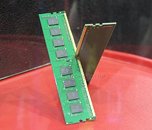- Joined
- Oct 9, 2007
- Messages
- 47,447 (7.50/day)
- Location
- Hyderabad, India
| System Name | RBMK-1000 |
|---|---|
| Processor | AMD Ryzen 7 5700G |
| Motherboard | ASUS ROG Strix B450-E Gaming |
| Cooling | DeepCool Gammax L240 V2 |
| Memory | 2x 8GB G.Skill Sniper X |
| Video Card(s) | Palit GeForce RTX 2080 SUPER GameRock |
| Storage | Western Digital Black NVMe 512GB |
| Display(s) | BenQ 1440p 60 Hz 27-inch |
| Case | Corsair Carbide 100R |
| Audio Device(s) | ASUS SupremeFX S1220A |
| Power Supply | Cooler Master MWE Gold 650W |
| Mouse | ASUS ROG Strix Impact |
| Keyboard | Gamdias Hermes E2 |
| Software | Windows 11 Pro |
GeIL showed off its first DDR4 memory module, which will serve as a common platform for a number of the company's consumer memory lines. Depending on the DRAM chip density, the module will come in capacities of 4 GB, 8 GB, and 16 GB. The module voltage will stay at 1.2V, and it will come in clock speeds of 1600 MHz (CL 10~12), 1866 MHz (CL 12~14), 2133 MHz (CL 14~16), 2400 MHz (CL 15), 2666 MHz, and 3200 MHz. GeIL will craft out several models based on this common PCB.

View at TechPowerUp Main Site

View at TechPowerUp Main Site



